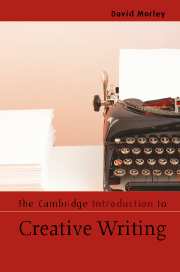Book contents
- Frontmatter
- Contents
- Preface
- Acknowledgements
- Chapter 1 Introducing creative writing
- Chapter 2 Creative writing in the world
- Chapter 3 Challenges of creative writing
- Chapter 4 Composition and creative writing
- Chapter 5 Processes of creative writing
- Chapter 6 The practice of fiction
- Chapter 7 Creative nonfiction
- Chapter 8 Writing poetry
- Chapter 9 Performing writing
- Chapter 10 Writing in the community and academy
- Illustrative bibliography
- Index
Chapter 4 - Composition and creative writing
Published online by Cambridge University Press: 05 June 2012
- Frontmatter
- Contents
- Preface
- Acknowledgements
- Chapter 1 Introducing creative writing
- Chapter 2 Creative writing in the world
- Chapter 3 Challenges of creative writing
- Chapter 4 Composition and creative writing
- Chapter 5 Processes of creative writing
- Chapter 6 The practice of fiction
- Chapter 7 Creative nonfiction
- Chapter 8 Writing poetry
- Chapter 9 Performing writing
- Chapter 10 Writing in the community and academy
- Illustrative bibliography
- Index
Summary
Whether it is right or advisable to create beings like Heathcliff, I do not know: I scarcely think it is. But this I know: the writer who possesses the creative gift owns something of which he is not always master – something that, at times, strangely wills and works for itself. He may lay down rules and devise principles, and to rules and principles it will perhaps for years lie in subjection; and then, haply without any warning of revolt, there comes a time when it will no longer consent to ‘harrow the valleys, or be bound with a band in the furrow’ – when it ‘laughs at the multitude of the city, and regards not the crying of the driver’ – when, refusing absolutely to make ropes out of sea-sand any longer, it sets to work on statue-hewing … As for you – the nominal artist – your share in it has been to work passively under dictates you neither delivered nor could question – that would not be uttered at your prayer, nor suppressed nor changed at your caprice. If the result be attractive, the World will praise you; if it be repulsive, the same World will blame you, who almost as little deserve blame.
charlotte brontë, editorial preface to Emily Brontë, Wuthering Heights (1847)We have seen how the composition of fiction, poetry and creative nonfiction is mostly a matter of reading and practice.
- Type
- Chapter
- Information
- The Cambridge Introduction to Creative Writing , pp. 88 - 124Publisher: Cambridge University PressPrint publication year: 2007

